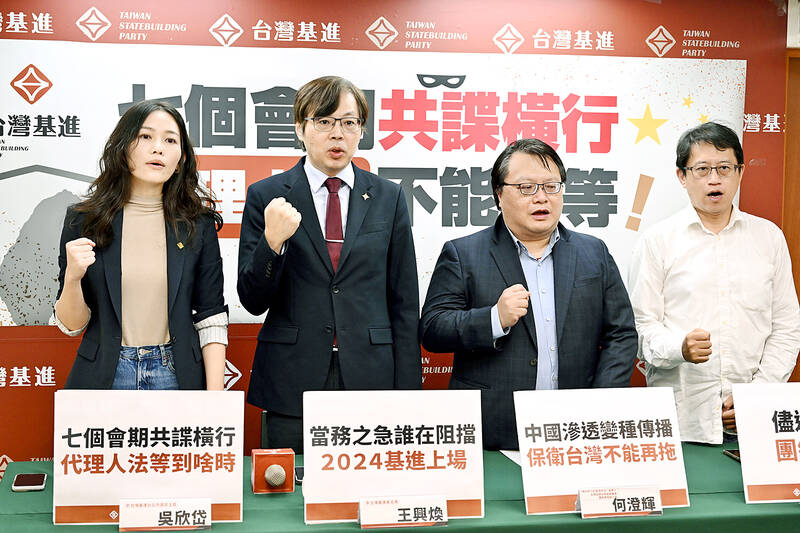The Taiwan Statebuilding Party, alongside Kuma Academy chief executive officer Ho Cheng-hui (何澄輝) and international law expert Sung Cheng-en (宋承恩), yesterday urged the Legislative Yuan to begin reviewing a proposed foreign influence transparency law to prevent Chinese infiltration.
Taiwanese should not tolerate the legislature’s indolence, party Chairman Wang Hsing-huan (王興煥) said.
The ruling and opposition parties are passive regarding efforts to mitigate the influence of Chinese “united front” rhetoric, said Wu Hsin-tai (吳欣岱), director of the Taiwan Statebuilding Party’s Taipei chapter.

Photo: George Tsorng, Taipei Times
Chinese infiltration must be funded, and the legal instrument to reveal such sources is still “frozen” in legislative processes, Wang said.
Wang accused Chinese Nationalist Party (KMT) and Taiwan People’s Party legislators of blocking the act, adding that the Democratic Progressive Party, which has a legislative majority, is turning a blind eye because it has to rely on the support of Taiwanese businesspeople in China.
If Taiwan does not have defenses against infiltration, China would have virtually no opposition in “buying out” Taiwan, Wang said.
The US, Australia and the UK have regulations and laws that mandate the registration of foreign agents with their respective governments, while Canada is also mulling similar legislation, Wu said.
Taiwan is lagging in similar legislative efforts, and amendments to the Act Governing Relations Between the People of the Taiwan Area and the Mainland Area (臺灣地區與大陸地區人民關係條例), the Criminal Code, the National Security Act (國家安全法), the Classified National Security Information Protection Act (國家機密保護法) and the National Intelligence Services Act (國家情報工作法) have been insufficient, Wu said.
The average prison sentence for Chinese spies is 18 months, with most allowed to post bail or have their sentence delayed, Wu said, adding that such leniency encourages others to spy for China.
Ho said that establishing legislation to register foreign agents would be a warning system for democracies.
If one does not uphold the democratic system, it is difficult to safeguard even greater values, such as justice and fairness, Ho added.
Not Only Taiwan is subject to Chinese infiltration, Sung said, adding that the international community is jointly facing the issue of China using its influence and wealth to foment strife and discord in free and open societies.
The draft act only covers the essential facets, and Chinese infiltration and “united front” rhetoric are far more sophisticated, Sung said, adding that the draft is sufficient to cover many deficiencies in the national security act.
If passed, Sung said that the bill would not automatically consider all Taiwanese businesspeople agents of China, as they would only become suspects if they receive money and have a systematic way of reporting to Chinese agents.

DAREDEVIL: Honnold said it had always been a dream of his to climb Taipei 101, while a Netflix producer said the skyscraper was ‘a real icon of this country’ US climber Alex Honnold yesterday took on Taiwan’s tallest building, becoming the first person to scale Taipei 101 without a rope, harness or safety net. Hundreds of spectators gathered at the base of the 101-story skyscraper to watch Honnold, 40, embark on his daredevil feat, which was also broadcast live on Netflix. Dressed in a red T-shirt and yellow custom-made climbing shoes, Honnold swiftly moved up the southeast face of the glass and steel building. At one point, he stepped onto a platform midway up to wave down at fans and onlookers who were taking photos. People watching from inside

A Vietnamese migrant worker yesterday won NT$12 million (US$379,627) on a Lunar New Year scratch card in Kaohsiung as part of Taiwan Lottery Co’s (台灣彩券) “NT$12 Million Grand Fortune” (1200萬大吉利) game. The man was the first top-prize winner of the new game launched on Jan. 6 to mark the Lunar New Year. Three Vietnamese migrant workers visited a Taiwan Lottery shop on Xinyue Street in Kaohsiung’s Gangshan District (崗山), a store representative said. The player bought multiple tickets and, after winning nothing, held the final lottery ticket in one hand and rubbed the store’s statue of the Maitreya Buddha’s belly with the other,

‘NATO-PLUS’: ‘Our strategic partners in the Indo-Pacific are facing increasing aggression by the Chinese Communist Party,’ US Representative Rob Wittman said The US House of Representatives on Monday released its version of the Consolidated Appropriations Act, which includes US$1.15 billion to support security cooperation with Taiwan. The omnibus act, covering US$1.2 trillion of spending, allocates US$1 billion for the Taiwan Security Cooperation Initiative, as well as US$150 million for the replacement of defense articles and reimbursement of defense services provided to Taiwan. The fund allocations were based on the US National Defense Authorization Act for fiscal 2026 that was passed by the US Congress last month and authorized up to US$1 billion to the US Defense Security Cooperation Agency in support of the

‘COMMITTED TO DETERRENCE’: Washington would stand by its allies, but it can only help as much as countries help themselves, Raymond Greene said The US is committed to deterrence in the first island chain, but it should not bear the burden alone, as “freedom is not free,” American Institute in Taiwan Director Raymond Greene said in a speech at the Institute for National Defense and Security Research’s “Strengthening Resilience: Defense as the Engine of Development” seminar in Taipei yesterday. In the speech, titled “Investing Together and a Secure and Prosperous Future,” Greene highlighted the contributions of US President Donald Trump’s administration to Taiwan’s defense efforts, including the establishment of supply chains for drones and autonomous systems, offers of security assistance and the expansion of